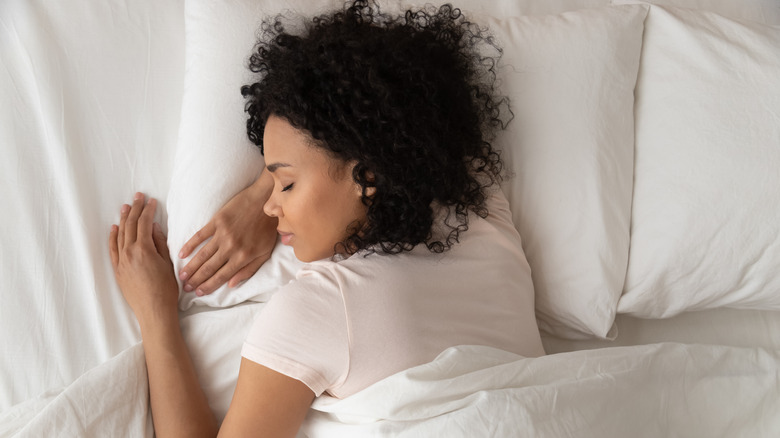Traveling East? Here's How To Combat Jet Lag
It's no secret that flying east can mean jet lag hits you that bit harder. The first few days of a trip to Europe can be lost in a haze of daytime sleepiness followed by nights spent staring at the ceiling of your hotel room, wide awake. But it doesn't have to be like that. There are several ways to alleviate jet lag, even when flying eastbound.
First, let's look at why jet lag happens. Basically, jet lag is the lag time between the place you're in and wherever your internal body clock thinks you are. Let's say you've traveled from Boston to Paris. (Lucky you!) While Paris is telling you it's 8 a.m. and time to wake up, your internal clock is set to 2 a.m., Boston time. Jet lag usually happens when you travel across two or more time zones.
OK, you probably know most of that already. But why is going east usually worse for travelers than going west? Because your body's natural rhythm does not follow an exact 24-hour day. Your natural circadian rhythm is slightly longer than 24 hours, meaning that it is easier to delay your internal clock, rather than advance it. Going east necessitates advancing your internal clock, ergo, jet lag tends to be worse. How much worse? A 2016 University of Maryland study showed that if you travel across nine time zones, it'll take you eight days to recover if you go westward, but 13 days if you go eastward. That's probably your entire vacation.
How to combat jet lag before you go
Just don't fly eastbound. We're kidding, obviously. We don't want you to miss out on Rome's history, South Africa's safaris, or the glitz of Dubai. To enjoy all of that, you need to realign your circadian rhythm as quickly as possible to your new time zone.
Luckily, there are many practical tips to help reduce jet lag, especially when traveling east. It all starts before you get anywhere near the plane. Our first tip is to shift your sleep and wake times toward your new destination before you leave. There are several apps that can help you calculate the best way to do that, including Timeshifter, or the Jet Lag Rooster on Sleepopolis' website. If you're traveling east, you'll need to go to bed earlier than normal, wake earlier than normal, and get light exposure as soon as you get out of bed. Light exposure is also key when you get to your destination, so if it's daytime there, get some sun on your face as quickly as possible.
However, going to bed earlier or later while at home might not be practical for you, so another tip is to select your flight times carefully. If you're traveling east, try to book a flight that arrives at your destination in the late afternoon or early evening. That way you can head straight to bed and avoid having a major napcident (an accidental nap; we've all been there).
On the plane and at your destination
We don't mean to be a killjoy, but once you get on the plane, you'll want to avoid alcohol and caffeine. No vodka and tomato juice or frothy cappuccino: instead, replace those drinks with water. The good news is that when you arrive at your destination, you should feel free to grab a coffee to try to stay awake. According to a 2011 study published by the National Library of Medicine, caffeine can help resynchronize the internal clock by helping eastbound travelers stay awake when necessary. It's also recommended to set your watch or phone to your destination time zone as soon as you're on the plane and try to follow sleep and waking schedules there, as well as mealtimes.
You've probably heard of melatonin as a way of alleviating jet lag too. The same study has shown that taking melatonin on the day of travel and for several days after arrival at your destination can significantly reduce your experience of jet lag. To take our Boston to Paris example again, this would mean taking a dose of melatonin at about 4 p.m. Boston time the day you're leaving and then at around 10 p.m. for the next few days while you're in Paris. A dose of .5mg of melatonin has been shown to be effective, though you should always talk with your healthcare provider before taking any kind of medication. Following these tips should ensure you feel as bright-eyed and bushy-tailed as possible when traveling east.


